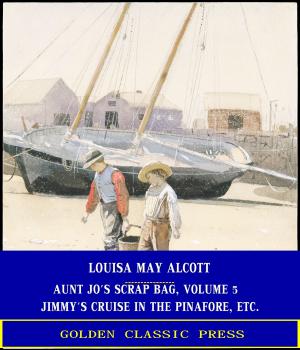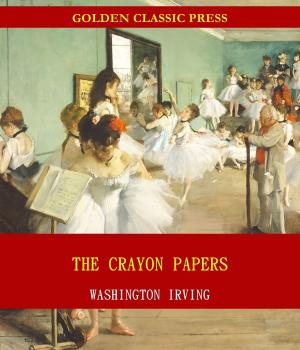| Author: | Thomas Bailey Aldrich | ISBN: | 1230002981017 |
| Publisher: | GOLDEN CLASSIC PRESS | Publication: | December 7, 2018 |
| Imprint: | Language: | English |
| Author: | Thomas Bailey Aldrich |
| ISBN: | 1230002981017 |
| Publisher: | GOLDEN CLASSIC PRESS |
| Publication: | December 7, 2018 |
| Imprint: | |
| Language: | English |
*** Original and Unabridged Content. Made available by GOLDEN CLASSIC PRESS***
Synopsis:
The motif of the story embodied in the following poem was crudely outlined in a brief sketch printed in an early collection of the authors verse, and subsequently cancelled for a purpose not until now accomplished. Wyndham Towers is not to be confused with this discarded sketch, the text of which has furnished only a phrase, or an indirect suggestion, here and there. That the writer's method, when recasting the poem, was more or less influenced by the poets he had been studying-chiefly the dramatists of the Elizabethan era-will, he hopes, be obvious. It was part of his design, however far he may have fallen from it, to give his narrative something of the atmosphere and color of the period in which the action takes place, though the story is supposed to be told at a later date. WYNDHAM TOWERS. Before you reach the slender, high-arched bridge, Like to a heron with one foot in stream, The hamlet breaks upon you through green boughs-A square stone church within a place of gravesUpon the slope; gray houses oddly grouped, With plastered gables set with crossed oak-beams, And roofs of yellow tile and purplish slate.That is The Falcon, with the swinging signAnd rustic bench, an ancient hostelry;Those leaden lattices were hung on hingeIn good Queen Bess's time, so old it is.On ridge-piece, gable-end, or dove-cot vane, A gilded weathercock at intervalsGlimmers-an angel on the wing, most like, Of local workmanship; for since the reignOf pious Edward here have carvers thrived, In saints'-heads skillful and winged cherubimMeet for rich abbeys. From yon crumbling tower, Whose brickwork base the cunning Romans laid-And now of no use else except to trainThe ivy of an idle legend on-You see, such lens is this thin Devon air, If it so chance no fog comes rolling in, The Torridge where its branching crystal spreadsTo join the Taw. Hard by from a chalk cliffA torrent leaps: not lovelier Sappho wasGiving herself all silvery to the seaFrom that Leucadian rock. Beneath your feetLie sand and surf in curving parallels.Off shore, a buoy gleams like a dolphin's backDripping with brine, and guards a sunken reefWhose sharp incisors have gnawed many a keel;There frets the sea and turns white at the lip, And in ill-weather lets the ledge show fang.A very pleasant nook in Devon, this, Upon the height of old was Wyndham Towers, Clinging to rock there, like an eagle's nest, With moat and drawbridge once, and good for siege;Four towers it had to front the diverse winds: Built God knows when, all record being lost, Locked in the memories of forgotten men.In Caesar's day, a pagan temple; nextA monastery; then a feudal hold;Later a manor, and at last a ruin.Such knowledge have we of it, vaguely caughtThrough whispers fallen from tradition's lip.This shattered tower, with crenellated topAnd loops for archers, alone marks the spot, Looming forlornly-a gigantic harpWhereon the invisible fingers of the windIts fitful and mysterious dirges play....
*** Original and Unabridged Content. Made available by GOLDEN CLASSIC PRESS***
Synopsis:
The motif of the story embodied in the following poem was crudely outlined in a brief sketch printed in an early collection of the authors verse, and subsequently cancelled for a purpose not until now accomplished. Wyndham Towers is not to be confused with this discarded sketch, the text of which has furnished only a phrase, or an indirect suggestion, here and there. That the writer's method, when recasting the poem, was more or less influenced by the poets he had been studying-chiefly the dramatists of the Elizabethan era-will, he hopes, be obvious. It was part of his design, however far he may have fallen from it, to give his narrative something of the atmosphere and color of the period in which the action takes place, though the story is supposed to be told at a later date. WYNDHAM TOWERS. Before you reach the slender, high-arched bridge, Like to a heron with one foot in stream, The hamlet breaks upon you through green boughs-A square stone church within a place of gravesUpon the slope; gray houses oddly grouped, With plastered gables set with crossed oak-beams, And roofs of yellow tile and purplish slate.That is The Falcon, with the swinging signAnd rustic bench, an ancient hostelry;Those leaden lattices were hung on hingeIn good Queen Bess's time, so old it is.On ridge-piece, gable-end, or dove-cot vane, A gilded weathercock at intervalsGlimmers-an angel on the wing, most like, Of local workmanship; for since the reignOf pious Edward here have carvers thrived, In saints'-heads skillful and winged cherubimMeet for rich abbeys. From yon crumbling tower, Whose brickwork base the cunning Romans laid-And now of no use else except to trainThe ivy of an idle legend on-You see, such lens is this thin Devon air, If it so chance no fog comes rolling in, The Torridge where its branching crystal spreadsTo join the Taw. Hard by from a chalk cliffA torrent leaps: not lovelier Sappho wasGiving herself all silvery to the seaFrom that Leucadian rock. Beneath your feetLie sand and surf in curving parallels.Off shore, a buoy gleams like a dolphin's backDripping with brine, and guards a sunken reefWhose sharp incisors have gnawed many a keel;There frets the sea and turns white at the lip, And in ill-weather lets the ledge show fang.A very pleasant nook in Devon, this, Upon the height of old was Wyndham Towers, Clinging to rock there, like an eagle's nest, With moat and drawbridge once, and good for siege;Four towers it had to front the diverse winds: Built God knows when, all record being lost, Locked in the memories of forgotten men.In Caesar's day, a pagan temple; nextA monastery; then a feudal hold;Later a manor, and at last a ruin.Such knowledge have we of it, vaguely caughtThrough whispers fallen from tradition's lip.This shattered tower, with crenellated topAnd loops for archers, alone marks the spot, Looming forlornly-a gigantic harpWhereon the invisible fingers of the windIts fitful and mysterious dirges play....















